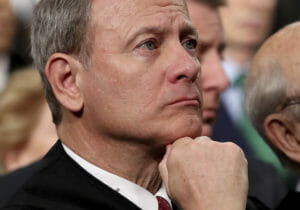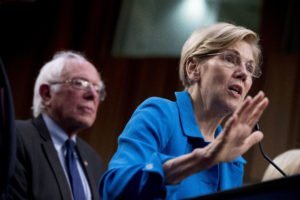Nearly Half of Doctors in LinkedIn Poll Back Single-Payer Health Care
Many said they would accept earning less if it meant less insurance bureaucracy, more time with patients and a clearer conscience as a result, the networking site reports. Phalinn Ooi / CC-BY-2.0
Phalinn Ooi / CC-BY-2.0
By Steven Rosenfeld / AlterNet
After the House bill defunding Obamacare and Medicaid failed, progressives in Congress and activists have been pushing for what they’ve wanted all along—to open up Medicare enrollment as a step toward a single-payer health system.
A new poll of 500 physicians by the business networking website LinkedIn found that nearly half, 48 percent, were in favor of a single-payer system, with 32 percent opposed and 21 percent undecided. What’s stunning about LinkedIn’s survey was not just the show of support for single-payer, but the comments and explanations from physicians about their industry’s greed-driven codependent relationship to insurers.
“As a doctor, it’s really against my best interest to support single-payer healthcare,” said Sean Kivlehan, the associate director of the international emergency medicine fellowship at Boston’s Brigham and Women’s Hospital, in LinkedIn’s report about the poll by Beth Kutcher. “It reduces my earning potential. At the same time, it’s about human rights and taking care of people that need help—that is why I do this work.”
Anyone who’s been surprised by medical insurance bills, high deductibles or spoken to the non-medical specialists after seeing physicians to try to find less expensive ways to access new drugs has crossed paths with this often-hidden codependent relationship. What’s never discussed by caregivers or insurance companies is how insurers rely on physicians’ offices as collection agents—and then in turn, pay these providers more money than they might otherwise earn in a single-payer system.
Kutcher reported that many medical professionals said they would accept earning less if it meant fewer dealings with insurers (which averages four hours a week), less insurance bureaucracy, more time with patients, and a freer conscience as a result.
“Even though doctors acknowledged that they might take a financial hit under a single-payer system, many respondents said it would be more than mitigated by getting out of the collection business,” she writes. “In other words, even if they earned less, there would be more patient care and less of the aggravation that comes with negotiating with and tracking down payment from multiple insurance companies.”
What’s stopping more physicians from supporting single payer? Some cited the political arguments about free markets, saying that competition and financial rewards in medicine have driven new advances and that could be stymied. More telling, however, was a trap awaiting medical school graduates. Many owe $100,000 or more in student loans, and partnering with private insurers as collection agents helps them get out of debt.
“Unlike other countries with single payer healthcare, medical school in the United States is very expensive—79% of med students were graduating with more than $100,000 in debt, according to the Association of American Medical Colleges,” Kutcher writes. “U.S. doctors need to generate a substantial income to pay that off—something that doctors in other countries don’t need to worry about.”
The way this ends up working goes to the heart of why for-profit healthcare is bad for physicians, bad for their staffs and bad for patients—bad for everyone except insurers and others whose profits come from pressuring doctors to collect more in fees.
Incredibly, the poll’s interviews with doctors suggest this nasty cycle is getting worse.
“While commercial insurance providers may be the most lucrative payers, they’re increasingly moving toward plans that require doctors to collect more money from patients before they can even submit a claim for reimbursement,” Kutcher wrote. “As many as 29% of people with employer-sponsored health insurance are enrolled in a high-deductible plan, according to the Kaiser Family Foundation. And people with high-deductible plans are more likely to delay care for financial reasons.”
The way patients see this system is when they interact with the billing staff at doctor’s offices. A study in the peer-reviewed journal, BMC Health Services Research, found that billing and insurance expenses totaled $70 billion for medical practices in 2012. The poll found two-thirds of the 500 doctors surveyed “implemented measures” to collect from patients with high-deductible plans. A fifth said they had to hire financial counselors.
It’s not new to hear doctors complain about arguing with insurers after their treatments are rejected or health plans don’t cover certain drugs. It’s also not new to hear doctors complain that it’s hard to get to know patients after they change insurers and medical records get lost in that transition process.
But the reality is a stunning snapshot of healthcare in America: Private insurers are increasingly treating physicians’ offices as their collection agents, pushing medical office front desks to grab more money from patients, while doctors have little choice but to go along to pay off their student debts, or accept it as the way to earn a six-figure income.
No wonder the prescription from nearly half of the physicians surveyed by LinkedIn is to get private insurers out of the healthcare field. The for-profit system is sick and isn’t allowing too many doctors to practice medicine the best way they know how.
Your support matters…Independent journalism is under threat and overshadowed by heavily funded mainstream media.
You can help level the playing field. Become a member.
Your tax-deductible contribution keeps us digging beneath the headlines to give you thought-provoking, investigative reporting and analysis that unearths what's really happening- without compromise.
Give today to support our courageous, independent journalists.






You need to be a supporter to comment.
There are currently no responses to this article.
Be the first to respond.